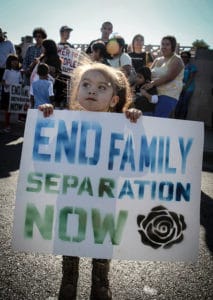A couple of years ago I was living and working in New York City, where I embraced the daily challenge of trying to integrate my faith with both my work life and the culture of the city.

New York City has five boroughs, where more than 8 million people speak over 800 languages in the sectors of commerce, finance, media, art, fashion, research, technology, education, and entertainment. Each sector prides itself on employing the brightest leaders to bring top-notch innovation to their field, and a 70-80-hour work week is common.
But that lifestyle imbalance quickly began to weigh on me. My closest relationships were with coworkers, as we not only worked together but also hung out after work. As a Christian, I knew my faith could not survive New York City without a church home that offered discipleship, accountability, and fellowship. So I quickly joined a church and began serving in leadership capacities, all while working my full-time day job as an admissions counselor at a Christian college in the city. I experienced much spiritual growth during this season of my life, but I also felt a lack of connection between my work life and spiritual life.
Growing up in an evangelical church, I knew that having a personal relationship with Jesus Christ and sharing my faith with those around me was an essential aspect of Christianity. My church emphasized parishioners surrendering to vocational ministry (e.g., pastoring a church and taking mission trips) as the best way to work for the kingdom of God. It wasn’t until I found myself working in a cubicle in downtown Manhattan surrounded by people of different denominations, cultures, and races that I began to question this theology of ministry.
In the early 20th century renowned English writer Dorothy Sayers stated, “In nothing has the church so lost her hold on reality as in her failure to understand and respect the secular vocation. She has allowed work and religion to become separate departments…” If this is true, the church is just another faith system rather than a transforming worldview, and this explains why the church has lost cultural influence over the past several decades.
Transformation for the common good
Redeemer Presbyterian Church in Manhattan takes Dorothy Sayers’ comment to heart in implementing a ministry called the Center for Faith & Work to engage Christians in the workplace. According to the church website, this ministry is the “cultural renewal arm of the Redeemer movement, founded to equip, connect, and mobilize [the] church community in their professional and industry spheres toward gospel-centered transformation for the common good.”
The center started organically in January 2003 when parishioners began meeting on Sundays out of a hunger to find connection between theology and their careers. Parishioners knew their careers mattered to God, but they did not know how to effectively use their careers to bring justice and shalom within the kingdom of God in New York. “One main theological and biblical foundation for the Center for Faith & Work is that we believe the gospel is a public truth and therefore changes everything! We must seek to broaden our scope of understanding the gospel’s power to transform not only at the personal level, but at the relational and societal levels as well,” says Amilee Watkins, leader development director of the center. Prior to joining the staff, Watkins also participated in the Center for Faith & Work’s 2008 inaugural class of Gotham Fellows, a nine-month intensive program designed to give theological and leadership training to young adults interested in integrating their faith with work.
Many Christians will balk at the idea of the gospel as a public truth, picturing folks standing on their desks and preaching into a bullhorn in hopes of converting coworkers. But this could not be farther from what Christ calls us to do. The apostle Peter says in 1 Peter 2:9, “But you are a chosen people, a royal priesthood, a holy nation, God’s special possession, that you may declare the praises of him who called you out of darkness into his wonderful light.” Christ is not just calling us to proclaim the gospel using words, but also to live out the gospel through our deeds. As Christians we are part of that royal priesthood; we are all priests with our own parishes. God has given us the responsibility within these personal parishes—which include our family, church, job, neighborhood, and friendships—to disciple, shape, and ultimately renew the culture and people around us by ushering in the kingdom of God through both our words and our deeds.
Timothy Keller, senior pastor of Redeemer, says, “The Center for Faith & Work is really just a way of discipling people for their public life.” It is Redeemer’s hope that a parishioner’s discipleship experience through the Center for Faith & Work will be a stepping-stone in discipling those in close proximity to their own lives, specifically relationships in the workplace. Watkins adds, “As we recognize that humans are made in the image of a triune God, a God who is in his very essence communal, we understand why human relationships matter.”
Redeemer’s holistic theological grounding of the biblical narrative—creation, fall, redemption, and renewal—gives space for parishioners to embrace the cultural mandate found in Genesis 1:28 and work toward a vision of new creation within their work environment. The word culture is derived from the Latin word cultura and is used to denote the cultivation, care, and tending of plants and animals. In a religious sense, the Latin word cultus, a derivation of cultura, has a worship component of revering or venerating. Thus, the cultural mandate to participate in the redemption of a broken society becomes a way of worshiping God. Each year the Center for Faith & Work holds a Gospel & Culture Conference at which keynote speakers share their experiences and ideas to infuse the culture with the gospel of Jesus Christ.
While the financial crisis of 2008 damaged much of the public trust in the economic, financial, and business sectors of society, Redeemer embraces the idea, expressed by Jeff Van Duzer in his book Why Business Matters to God, that “Business exists in order to produce goods and services that would enable the community to flourish.” While acknowledging that it can be used for ill gain, Redeemer views business primarily as a way to work for the common good of society.
The Center for Faith & Work addresses this issue with two vocational groups, the Business Fellowship and the Financial Services Ministry. Both of these groups are parishioner-led and hold monthly meetings involving prayer, fellowship, and lectures pertaining to business and finance. Often the lectures include taking a secular leadership manual or article, juxtaposing it with the gospel, and having an informative discussion afterwards. In the Financial Services Ministry, worksite leaders in six of the top financial institutions—Barclays, Blackrock, Citigroup, Goldman Sachs, Morgan Stanley, UBS—engage weekly with other members of the ministry who work in their institution. The group also offers an eight-week Faith and Finance course twice a year to the Redeemer community and participates in various service projects, such as finance coaching for small business owners, hosting a women’s networking night in the Bowery Mission, and taking mission trips to Honduras that focus on microfinance projects.
Weaving the gospel into every area of life
The Center for Faith & Work also understands the lasting benefit of creating new business ventures that reflect the redeeming principles of Christianity. In 2005, the Entrepreneurship Initiative (Ei) was created to meet this need. In the words of the center’s executive director, Katherine Leary Alsdorf, its purpose is to be a “church-planting network for non-church planters.” Ei has four main components: the Ei Forum, the NYC Entrepreneurs Fellowship, the NYC Business Plan Competition, and the Ei Network.
The NYC Entrepreneurs Fellowship is a vocational group that meets monthly, enabling entrepreneurs to inspire and support each other. The annual NYC Business Plan Competition brings together entrepreneurs across the New York City area to participate in workshops where marketplace leaders can help write or tweak contestants’ business plans prior to the competition itself. After a rigorous selection process, the finalists present their plans to a panel of judges. Winners receive a year of coaching, consulting, and financial planning advice from the Center for Faith & Work along with $5,000 to $20,000 of capital to start their venture.
April Nickell, program director and arts educator at Jaradoa Theater and a 2008 NYC Business Plan winner, talks about how the competition process helped clarify her vision. In a video posted on the website, she says, “It was so great to be forced to answer questions such as, ‘Why do we exist? Why should we exist? What is the problem in the world? What is the unique solution? And how am I going to be sustainable?’” Nickell and 19 other past winners have ventures in everything from nonprofits working against sex trafficking to for-profits in search engine optimization and social networking.
With the aid of the annual Ei Forum, in which entrepreneurs and investors all over the country come together and collaborate on best practices to start a movement of gospel-centered ventures, the Ei Network has emerged. This network of individuals and organizations around the globe fosters creativity, synergy, and empowerment, and brings financial capital to the cities where the members operate.
Redeemer’s Center for Faith & Work has strategically emphasized both social justice and personal salvation, weaving the thread of the gospel into each area of their ministries to bring about holistic cultural transformation across New York City. The center is also one of the few ministries in Manhattan that embraces those in the arts—actors, dancers, fashion designers, filmmakers, musicians, and writers—and incorporates them in the mission of cultural renewal through fellowships, exhibitions, and monthly vocational group meetings.
As evangelical Christians we are sometimes quick to assume that Jesus’ call in “making disciples of all nations” is only for those in vocational ministry or doing mission work in a distant country. Could discipleship be this and so much more? Surely discipleship is meant for everyone, from the sexton to the pastor and from the secretary to the CEO, especially for the ordinary Christian living in the daily grind of work. What would it take for the church at large to embrace this? Jesus reached people not only on a spiritual level but also within the social, economic, and political contexts of the day. If the church is intentional about discipling, nurturing, and growing parishioners holistically, Christians will in turn be equipped to reach people in a holistic manner, even in the workplace. It is time to call forth the priests to find and embrace their parishes—just as they are doing so effectively at Redeemer’s Center for Faith & Work.
Landon Eckhardt is currently living and working in Washington Heights, a neighborhood in upper Manhattan in New York City. As a barista at a local Starbucks in his neighborhood, he is seeking to renew culture by living out the gospel (both word and deed) at work. He is also pursuing an MDiv/MBA in economic development dual degree from Palmer Theological Seminary of Eastern University.

You invest a significant part of your life working—and it matters. The NIV Faith and Work Bible from Zondervan aims to help you find a renewed purpose and passion in your daily work life. It doesn’t matter what job or career you have, this Bible emphasizes how relevant God’s Word is to your daily work life.


